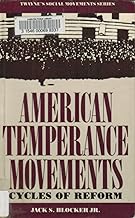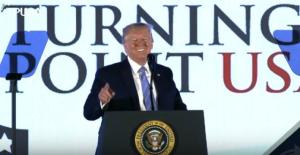Donald Trump’s May 30th conviction by a jury of his peers on 34 felony counts inspired countless pundits to declare that America had entered a “new era.” For example, a Wall Street Journal editorial called the verdict the beginning of a “new and destabilizing era,” and Al Mohler called it “a major turning point in American history.” Even the response to the verdict has been declared a turning point. Ronald Brownstein in The Atlantic claimed that Republicans’ denunciation of the verdict ushered America into a “dangerous new era.” (It’s like we entered one era on Thursday and another one by Friday. Boy that first era was short!) Well . . . everyone . . . welcome to a “new era” in American history! We are almost two weeks in. Are you feeling it yet?
Such hyperbole triggers the historian in me to reflexively respond with many questions. Here is a sampling: What makes Trump’s conviction a “turning point” or a “new era” in American history? Is it really a “new era?” How would we know? What makes the events of May 30, 2024 any more of a “turning point” than a whole list of other events that have occurred since Trump announced his presidential candidacy on June 16, 2015? But more on this in a moment. Let me first offer a mini history lesson.
One of the timeworn tasks of historians is to identify turning points in history, or to define historical time periods, aka periodization. The historians who most enjoy this exercise tend to believe that we need some distance in time between us and the matter being studied so that we can acquire a degree of objectivity and begin to perceive some cause and effect over time. Most historians would consider it an act of hubris (or journalism) to declare that an event that occurred literally yesterday is a “historical turning point.” Historians are not prophets. Unlike historians, however, pundits and opinion columnists tend to be rewarded for prophetic utterances.
The act of periodization falls under one of the so-called “five C’s” of history, namely, change over time. It is so foundational to our profession that in graduate school I once earned a B+ on a research paper primarily because I failed to demonstrate change over time. The scholarship of every field of history employs widely recognized turning points, but occasionally historians argue for a different periodization scheme than the commonly accepted one, and I have always enjoyed reading alternative periodization models.
In western civilization, the most basic periodization scheme is ancient/medieval/modern. In U.S. history, it is common to create two-part U.S. history survey courses and two-part African American history survey courses. Many schools end the first half of each course with the end of the Civil War (1865), but some end it with the Compromise of 1877 which ended the era of Reconstruction. In my own area of research, 19th century temperance, Jack S. Blocker Jr.’s American Temperance Movements book offered the most common periodization model, but I have suggested another one that conflates two of his time periods into one.
When I was a student during the 20th century, I was told by one of my history professors that as far as historians are concerned, “history” ended about 40 years ago, and everything since then is “current events.” The rise of bullet point communication, the internet, social media, and instantaneous worldwide news has substantially altered communication since the 1980s, so now in this century, the Anxious Bench blog on which this post is appearing, is only one of many 21st century venues (blogs, podcasts, substacks, etc.) where historians are systematically ignoring this tradition in order to join conversations about current events using their historical lens. So this is my take on Donald Trump and historical turning points. (For full disclosure, 2004 was the last time I voted in a presidential general election.)
Donald Trump has built his presidential campaigns and presidency by brazenly crossing unwritten lines, and then boldly inhabiting previously uninhabited legal, procedural, constitutional, and rhetorical spaces. Period. That is “the Donald’s” political playbook. It is a difference in kind, not degree, from previous presidents and presidential candidates. (See here for an example of how he is different in kind from his predecessors.)
Some of these are practices with judicially unexplored ramifications (pardoning himself), some are potentially treasonous (alternate elector scheme and attempts to overthrow 2020 election by fiat), and some undermine longtime practices that evolved to build confidence in the integrity of the person and the office of the presidency (his refusal to release his tax returns and how he relates to foreign leaders). And Trump is promising to continue this trend in constitutionally threatening ways if re-elected by trying to directly control spending himself. With the exception of Congress, other institutions, such as the media and the judicial system, have been slow to adapt to Trump’s re-conceptualization of the presidency.
However, in the case of Trump’s New York civil and criminal trials, we have witnessed what can happen when the judicial system creatively adapts itself to Trump. New York City and state law enforcement have become as baldly political as Trump has been crassly disrespectful of presidential traditions and the office itself. He is unaccustomed to the judiciary stepping into the same legal, procedural, constitutional, and rhetorical gray zones he inhabits, and so they have collided. He is upset that they are merely doing what he has been doing for years.
These collisions (the felony convictions and his unfavorable civil verdict) seem to be merely two more stops on the train ride to a “new era” in American history we are all experiencing. Turning points between eras are often more akin to “local” subways with many stops, than to express trains. Our nation has been on something akin to the “8th Avenue local” (a NYC subway) since at least June 2015. Below I identify some of the many “local stops” we’ve experienced along the way that any prescient observer could have dubbed the dawn of a “new and destabilizing era,” or a major “turning point.”
Arguably the first stop was how The Apprentice reality TV show created a misleading image and overwhelming nationwide name recognition for Trump. (here and here) (New Yorkers, of course, already possessed an image of Trump independent of his reality TV show, and have twice overwhelmingly rejected him for president.)
Perhaps the next stop was when voters decided they could excuse a presidential candidate who said as part of his candidacy announcement that Mexico was “sending people who have lots of problems. . . they are bringing drugs . . . they are rapists.” (Black people also have been called “black beast rapists.”)
Another stop was when voters decided they could excuse Trump’s practice of encouraging individual violence from the podium during his rallies. Surely this heralded a “new and destabilizing era” in American history!
Then there were the many many stops in the white evangelical community, as millions of “evangelical voters,” one by one, rationalized how they could vote for Trump despite his disturbing character issues. A month after declaring his candidacy, during the Family Leadership Summit, Trump doubled down on his comments about Mexicans. Then, when asked if he ever asked God for forgiveness, said: “I am not sure I have. I just go on and try to do a better job from there. I don’t think so,” he said. “I think if I do something wrong, I think, I just try and make it right. I don’t bring God into that picture. I don’t.” (here and here) Months later he doubled down on that answer. The fact that masses of “evangelical voters” did not flee his candidacy like the plague after such bone chilling hubris from a presidential wanna be, surely merits the moniker “major historical turning point.”
Another stop in the evangelical community on the way to May 30 was when evangelical voters en masse decided that the Bible verses and practical theology contained in such documents as the 1998 Southern Baptist “Resolution of Moral Character of Public Officials” and in James Dobson’s September letter of that same year to his supporters regarding the Clinton-Lewinsky scandal should only apply to Democratic presidential candidates. (This matter resurfaced again just last week on Anderson Cooper.) John Piper parsed the theological legerdemain practiced by millions of evangelical voters as only he could, when he said he was
“baffled that so many Christians consider the sins of unrepentant sexual immorality (porneia), unrepentant boastfulness (alazoneia), unrepentant vulgarity (aischrologia), unrepentant factiousness (dichostasiai), and the like, to be only toxic for our nation, while policies that endorse baby-killing, sex-switching, freedom-limiting, and socialistic overreach are viewed as deadly.
The reason I put those Greek words in parentheses is to give a graphic reminder that these are sins mentioned in the New Testament. To be more specific, they are sins that destroy people. They are not just deadly. They are deadly forever.”
These historic “turning points” among evangelicals were so disturbing that they generated a wave of scholarship exploring the “crisis” of the evangelical world, as Thomas Kidd put it in his book.
Then there was Kellyanne Conway’s infamous “alternative facts” statement that artfully employed postmodern thinking to burnish Trump’s image in response to the obviously low attendance at his inauguration. Surely that was some kind of “new era!”
Trump was the first president to be impeached twice.
There have been so many local stops!
Then there was Trump’s December 19, 2020 “Be there. Will be wild!” tweet encouraging followers to attend a protest in D.C. on January 6. Never before had a president called for a protest in D.C. after being told by his attorney general and others that he had lost the election. Why not call that a new era?
Of course there were the events of January 6, 2021 itself, where so called “patriotic” Americans rioted and invaded the capitol for the express purpose of interrupting a constitutional proceeding of Congress. Police officers who tried to stop the rioters were injured, and are now disdained by many Republican lawmakers. Lawmakers and Trump initially criticized the rioters, but then did a 180 and now call them persecuted patriots. (This paragraph would have been nonsensical and unbelievable if written any time in our history before the 2020 presidential election.)
The list of stops goes on and on. You get the idea.
Trump’s conviction was many things, and it might have been a “major” turning point, but I doubt it. (Time will tell.) Using another metaphor, I suspect it was just another mile marker on a miles-long exit ramp from our Founding Fathers’ vision for responsible and moral self-government at the federal level.
Americans have always said our president is not above the law, so now our legal system has the opportunity to demonstrate that this is in fact the case, and not merely a canard. But it is likely that the only way our legal system can actually hold Trump accountable for some of his behaviors is for it to move into and in ambiguous spaces like Trump does. Yes, Trump’s presidential-related actions are also changing related American governing institutions, and he wants to be reelected so he can do more of that. (see Project 2025)
But all of these changes can only occur because so many earlier “turning points” had already occurred in the hearts and minds of so many voters in a few swing states. In light of such a long list of unprecedented events associated with Trump’s candidacy and presidency, his conviction alone (nor the Republican response to it) should not be seen as a unique marker of a “new and destabilizing day” in American history. Almost any well informed person could have predicted the events of May 30th.
















